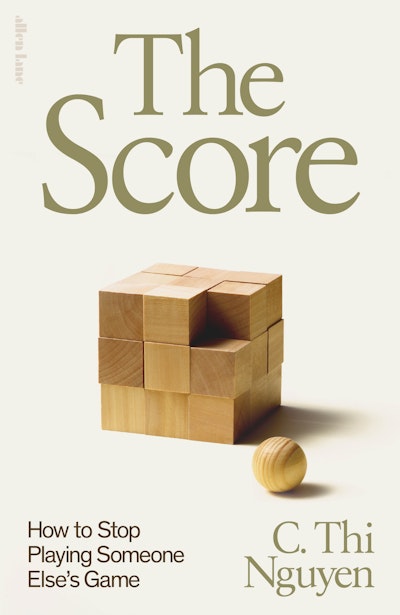- Published: 13 January 2026
- ISBN: 9780241653982
- Imprint: Penguin eBooks
- Format: EBook
- Pages: 368
The Score
How to Stop Playing Someone Else’s Game
- Published: 13 January 2026
- ISBN: 9780241653982
- Imprint: Penguin eBooks
- Format: EBook
- Pages: 368
There are certain concepts that, once they’re explained to you, you start to see everywhere. Thi Nguyen’s notion of value capture is exactly this kind of idea—it’s deceptively simple but profoundly insightful. I haven’t been able to stop thinking about it. This book beautifully encapsulates Nguyen’s thinking on the relationship between our values, our goals, and the metrics by which we measure ourselves and others. Nguyen is one of the rare academics who can render a complex theory accessible and engaging without dumbing it down. The net result is an outstanding piece of philosophy that experts and non-experts can both enjoy. But consider yourself warned: you might not be able to stop thinking about it either
Elizabeth Barnes, author of <i> Health Problems </i>
As a long-time fan of games, I was delighted to find a philosophical look at how we make choices in life. If you love gaming, this is the best book on the topic you’ll ever find
Steve Wozniak, cofounder of Apple
I do not care about games. Or at least, I didn’t think that I did. But I was riveted from start to finish by THE SCORE, which made me rethink my relationship with my health, my bank account, and even my writing, in this moment of increasing gamification via substack. Such is the power and scope of this brilliant and timely book
Kate Manne, author of <i> Down Girl </i>
Almost everything you do at work, at home, and in even in your relationships, has been turned into a game with scores that supposedly show how well you’re doing it. And yet, you probably feel punished rather than rewarded by all those measures. The Score explains why and how you can wrest yourself free of the bad games that have captured you.
Ian Bogost, Professor of Film & Media Studies and Computer Science & Engineering at Washington University
The Score isn’t an instruction manual for life; it’s something deeper. It teaches you to rewrite the rules, so you can live the way that suits you. Thi Nguyen is a mad genius, sharing the secret sauce to his cool
Scott Hershovitz, author of <i> Nasty, Brutish, and Short </i>
This is a book about the quantitative vs. the qualitative: what happens to our sense of humanity when we submit to institutional demands that reduce the world to a set of rules? The Score is a call to reconnect with play—in our leisure time, in our experience of art, and in how we interact with friends and loved ones. And that sounds like fun to me
Eric Zimmerman, founding faculty and Arts Professor at the NYU Game Center
One of the most clever and revealing books I have read in a long time. It genuinely changed how I think
Johann Hari, author of <i> Stolen Focus </i>
[A] trenchant philosophical investigation…. Illustrating his ideas with lucid philosophy and descriptions of his own innumerable hobbies (Tetris, bouldering, yo-yo), Nguyen skillfully explores the ways in which humans think about progress, creativity, and play. It makes for a captivating look at how imperfect measures of success shape society
Publishers Weekly, starred review
Delightfully irreverent... An engaging look at the games we play and whatever freedom we might have as we do so
Kirkus
Nguyen is lucid, entertaining and precise, illustrating ideas with a mix of personal stories and real-world examples. He has a particular knack for conveying the specific, intrinsic pleasures of his many enthusiasms... The Score is a compelling read, urgent but never alarmist.... I came away enriched and uplifted
Tim Clare, Guardian
Part polemic and part philosophical inquiry... profound … If we truly want to understand our civic plight – and not just tick off some talking points – then we should read The Score
Simon Ings, Telegraph
'[A] subtle and stimulating philosophical examination of the increasingly ubiquitous phenomenon of scoring systems... advocating a kind of playful rebellion against rules and metrics... I give this excellent book five stars
Stuart Jeffries, Financial Times
Brilliant and wildly original … profound, rigorous and frequently beautiful book … socially attentive, historically literate and imbued with sensual glee
Becca Rothfeld, Washington Post
Mind-expanding… so exuberant and readable that the depth and seriousness of its insights almost sneak up on you
Jennifer Szalai, New York Times
Playful, fresh... Nguyen convincingly shows why choosing to abide by the rules in the artificial sandbox of games can help us explore, be open and get exposure to life's richness
Alex Wilkins, New Scientist
Beautifully written and full of aphoristic wit... From time to time, a book comes along that causes the reader to reconsider just about everything... the results are extraordinary
Matthew d'Ancona, The New World



